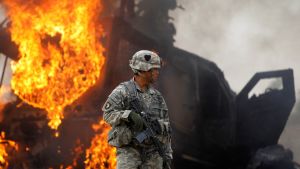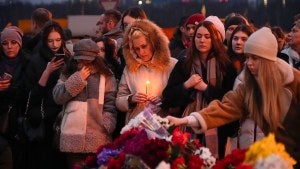Steady Decline in American Concerns About Terrorism

But nearly a quarter century after the September 11 attacks, Americans still view international terrorism as among the most critical threats to the United States.
Today marks the 24th anniversary of the September 11 attacks, in which nearly 3,000 Americans were killed in a set of four coordinated terrorist attacks against the United States. The attacks not only reshaped US foreign policy and incited two decades of war in the Middle East but also left an enduring mark on the American collective consciousness. Data from the 2025 Chicago Council Survey, fielded July 18-30, 2025, finds that almost a quarter of a century later, the threat of international terrorism continues to resonate with Americans.
International Terrorism Still Seen as a Threat to United States
Americans have become less likely to consider international terrorism a critical threat to the United States over the last decade, but the issue remains salient to more than half of the general public (55% critical threat). In fact, of the possible threats listed in this question—including the development of China as a world power (50%) or a global economic downturn (49%)—international terrorism is one of the top three issues Americans view as critical to US interests.
Since the Council first started asking about the threat of international terrorism in 1998, Republicans have always been more likely than other partisans to perceive it as a critical threat—with a few exceptions. That continues today: Republicans are most likely to think international terrorism poses a critical threat to the United States (68%), while Democrats and Independents are more divided (52% and 48%, respectively). Although Republican concerns about terrorism have declined from the high levels of the 2000s and 2010s, they have recently increased since 2022.
Conclusion
More than two decades after the 9/11 attacks, the threat of international terrorism remains a top concern for Americans. These survey results show that, while no longer dominating headlines, the attacks continue to shape how Americans—and the partisans—weigh threats facing the United States.
This analysis is primarily based on data from the 2025 Chicago Council Survey of the American public on foreign policy, a project of the Lester Crown Center on US Foreign Policy.
The 2025 Chicago Council Survey was conducted July 18-30, 2025, by Ipsos using its large-scale nationwide online research panel (KnowledgePanel) in English and Spanish among a weighted national sample of 2,148 adults 18 or older living in all 50 US states and the District of Columbia. The margin of sampling error for the full sample is ±2.2 percentage points, including a design effect of 1.07.
Partisan identification is based on how respondents answered a standard partisan self-identification question: “Generally speaking, do you think of yourself as a Republican, a Democrat, an Independent, or what?”
The 2025 Chicago Council Survey is made possible by the generous support of the Crown family and the Korea Foundation.
Additional results reported from March 2025 are from a Chicago Council on Global Affairs-Ipsos survey conducted March 14-16, 2025 by Ipsos using its large-scale, nationwide, online research panel (KnowledgePanel) among a weighted national sample of 1,021 adults 18 or older living in all 50 US states and the District of Columbia. The margin of sampling error for the full sample is ±3.2 percentage points including a design effect of 1.09.
The data for the total sample were weighted to adjust for gender by age, race/ethnicity, education, Census region, metropolitan status, and household income using demographic benchmarks from the 2024 March Supplement of the Current Population Survey (CPS). The specific categories used were:
- Gender (Male, Female) by Age (18–29, 30–44, 45-59 and 60+)
- Race/Hispanic Ethnicity (White Non-Hispanic, Black Non-Hispanic, Other, Non-Hispanic, Hispanic, 2+ Races, Non-Hispanic)
- Education (Less than High School, High School, Some College, Bachelor or higher)
- Census Region (Northeast, Midwest, South, West)
- Metropolitan status (Metro, non-Metro)
- Household Income (Under $25,000, $25,000-$49,999, $50,000-$74,999, $75,000-$99,999, $100,000-$149,999, $150,000+)


Related Content
 Public Opinion
Public Opinion
On the 20th anniversary of 9/11, new polling finds that Americans still see international terrorism as a critical threat.
 Public Opinion
Public Opinion
Polling conducted in July for the 2021 Chicago Council Survey found seven out of ten Americans supported the withdrawal of US combat forces from Afghanistan by September 11.
 Public Opinion
Public Opinion
Before the Crocus City Hall attack, a plurality of Russian young adults said Russia’s top foreign policy priority should be bolstering the country’s physical defenses.